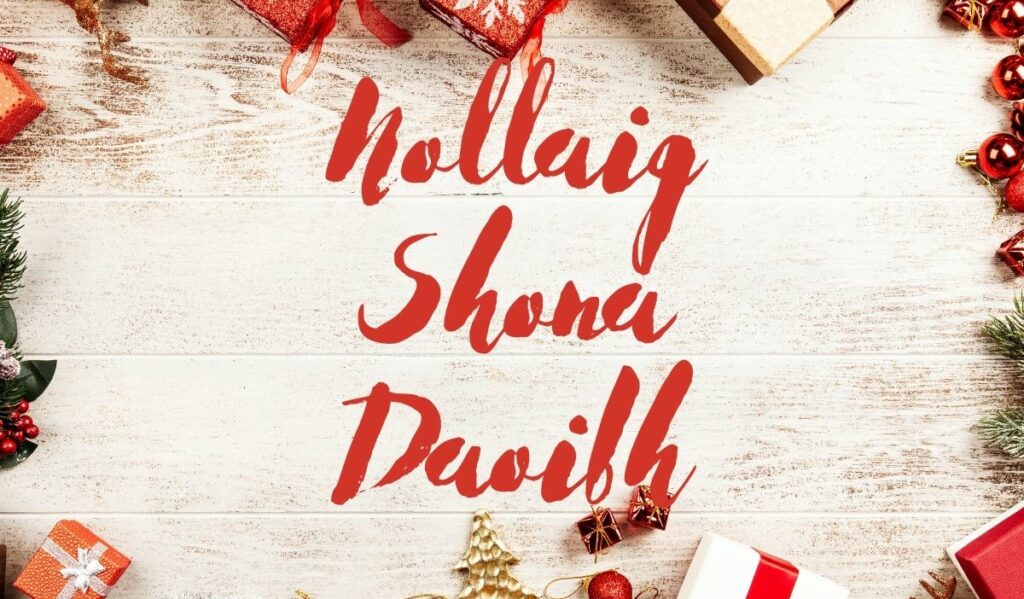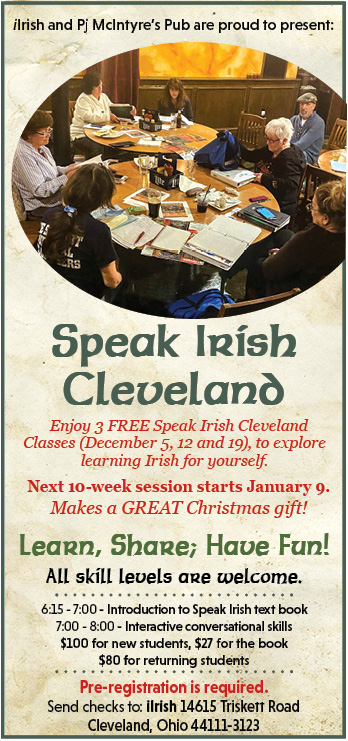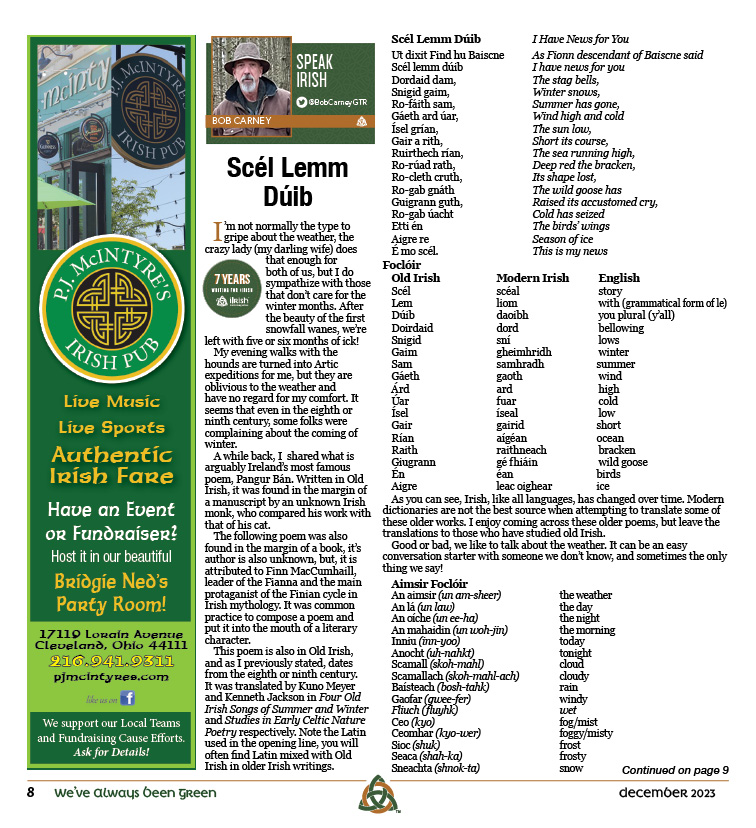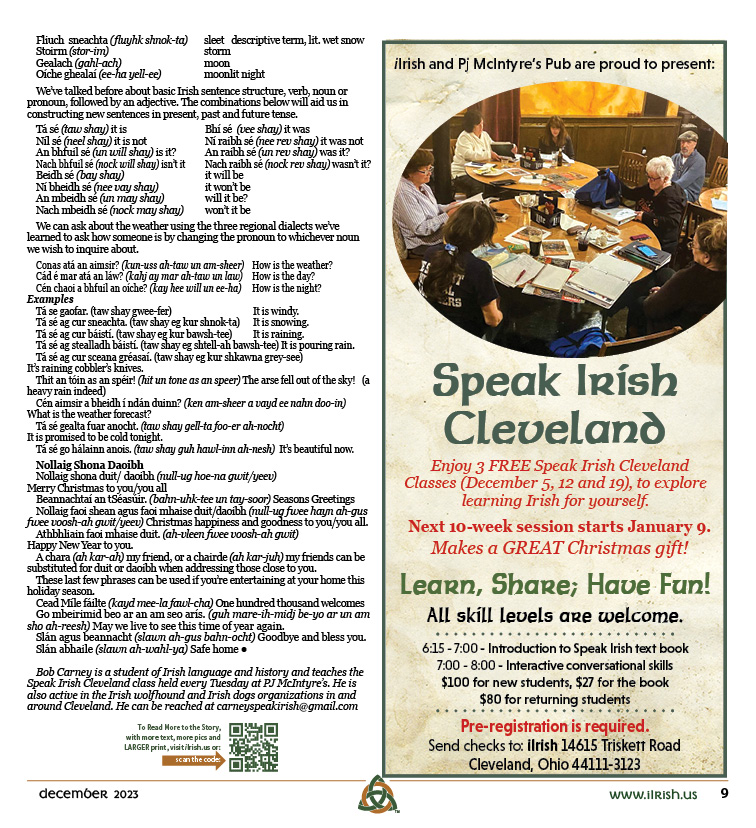
By Bob Carney
I’m not normally the type to gripe about the weather, the crazy lady (my darling wife) does that enough for both of us, but I do sympathize with those that don’t care for the winter months. After the beauty of the first snowfall wanes, we’re left with five or six months of ick!
My evening walks with the hounds are turned into Artic expeditions for me, but they are oblivious to the weather and have no regard for my comfort. It seems that even in the eighth or ninth century, some folks were complaining about the coming of winter.
A while back, I shared what is arguably Ireland’s most famous poem, Pangur Bán. Written in Old Irish, it was found in the margin of a manuscript by an unknown Irish monk, who compared his work with that of his cat.
The following poem was also found in the margin of a book, it’s author is also unknown, but, it is attributed to Finn MacCumhaill, leader of the Fianna and the main protaganist of the Finian cycle in Irish mythology. It was common practice to compose a poem and put it into the mouth of a literary character.
This poem is also in Old Irish, and as I previously stated, dates from the eighth or ninth century. It was translated by Kuno Meyer and Kenneth Jackson in Four Old Irish Songs of Summer and Winter and Studies in Early Celtic Nature Poetry respectively. Note the Latin used in the opening line, you will often find Latin mixed with Old Irish in older Irish writings.
Ut dixit Find hu Baiscne As Fionn descendant of Baiscne said
Scél lemm dúib I have news for you
Dordaid dam, The stag bells,
Snigid gaim, Winter snows,
Ro-fáith sam, Summer has gone,
Gáeth ard úar, Wind high and cold
Ísel grían, The sun low,
Gair a rith, Short its course,
Ruirthech rían, The sea running high,
Ro-rúad rath, Deep red the bracken,
Ro-cleth cruth, Its shape lost,
Ro-gab gnáth The wild goose has
Guigrann guth, Raised its accustomed cry,
Ro-gab úacht Cold has seized
Etti én The birds’ wings
Aigre re Season of ice
É mo scél. This is my news
Old Irish Modern Irish English
Scél scéal story
Lem liom with (grammatical form of le)
Dúib daoibh you plural (y’all)
Doirdaid dord bellowing
Snigid sní flows
Gaim gheimhridh winter
Sam samhradh summer
Gáeth gaoth wind
Árd ard high
Úar fuar cold
Ísel íseal low
Gair gairid short
Rían aígéan ocean
Raith raithneach bracken
Giugrann gé fhiáin wild goose
Én éan birds
Aigre leac oighear
As you can see, Irish, like all languages, has changed over time. Modern dictionaries are not the best source when attempting to translate some of these older works. I enjoy coming across these older poems, but leave the translations to those who have studied old Irish.
Good or bad, we like to talk about the weather. It can be an easy conversation starter with someone we don’t know, and sometimes the only thing we say!
An aimsir (un am-sheer) the weather
An lá (un law) the day
An oíche (un ee-ha) the night
An mahaidin (un woh-jin) the morning
Inniu (inn-yoo) today
Anocht (uh-nahkt) tonight
Scamall (skoh-mahl) cloud
Scamallach (skoh-mahl-ach) cloudy
Baísteach (bosh-tahk) rain
Gaofar (gwee-fer) windy
Fliuch (fluyhk) wet
Ceo (kyo) fog/mist
Ceomhar (kyo-wer) foggy/misty
Sioc (shuk) frost
Seaca (shah-ka) frosty
Sneachta (shnok-ta) snow
Fliuch sneachta (fluyhk shnok-ta) sleet descriptive term, lit. wet snow
Stoirm (stor-im) storm
Gealach (gahl-ach) moon
Oíche ghealaí (ee-ha yell-ee) moonlit night
We’ve talked before about basic Irish sentence structure, verb, noun or pronoun, followed by an adjective. The combinations below will aid us in constructing new sentences in present, past and future tense.
Tá sé (taw shay) it is Bhí sé (vee shay) it was
Níl sé (neel shay) it is not Ní raibh sé (nee rev shay) it was not
An bhfuil sé (un will shay) is it? An raibh sé (un rev shay) was it?
Nach bhfuil sé (nock will shay) isn’t it Nach raibh sé (nock rev shay) wasn’t it?
Beidh sé (bay shay) it will be
Ní bheidh sé (nee vay shay) it won’t be
An mbeidh sé (un may shay) will it be?
Nach mbeidh sé (nock may shay) won’t it be
We can ask about the weather using the three regional dialects we’ve learned to ask how someone is by changing the pronoun to whichever noun we wish to inquire about.
Conas atá an aimsir? (kun-uss ah-taw un am-sheer) How is the weather?
Cád é mar atá an láw? (kahj ay mar ah-taw un law) How is the day?
Cén chaoi a bhfuil an oíche? (kay hee will un ee-ha) How is the night?
Tá se gaofar. (taw shay gwee-fer) It is windy.
Tá sé ag cur sneachta. (taw shay eg kur shnok-ta) It is snowing.
Tá sé ag cur báistí. (taw shay eg kur bawsh-tee) It is raining.
Tá sé ag stealladh báistí. (taw shay eg shtell-ah bawsh-tee) It is pouring rain.
Tá sé ag cur sceana gréasaí. (taw shay eg kur shkawna grey-see) It’s raining cobbler’s knives.
Thit an tóin as an spéir! (hit un tone as an speer) The arse fell out of the sky! (a heavy rain indeed)
Cén aimsir a bheidh í ndán duinn? (ken am-sheer a vayd ee nahn doo-in) What is the weather forecast?
Tá sé gealta fuar anocht. (taw shay gell-ta foo-er ah-nocht) It is promised to be cold tonight.
Tá sé go hálainn anois. (taw shay guh hawl-inn ah-nesh) It’s beautiful now.
Nollaig shona duit/ daoibh (null-ug hoe-na gwit/yeev) Merry Christmas to you/you all
Beannachtaí an tSéasúir. (bahn-uhk-tee un tay-soor) Seasons Greetings
Nollaig faoi shean agus faoi mhaise duit/daoibh (null-ug fwee hayn ah-gus fwee voosh-ah gwit/yeev)
Christmas happiness and goodness to you/you all.
Athbhliain faoi mhaise duit. (ah-vleen fwee voosh-ah gwit) Happy New Year to you.
A chara (ah kar-ah) my friend, or a chairde (ah kar-juh) my friends can be substituted for duit or daoibh when addressing those close to you.
These last few phrases can be used if you’re entertaining at your home this holiday season.
Cead Míle fáilte (kayd mee-la fawl-cha) One hundred thousand welcomes
Go mbeirimid beo ar an am seo arís. (guh mare-ih-midj be-yo ar un am sho ah-reesh) May we live to see this time of year again.
Slán agus beannacht (slawn ah-gus bahn-ocht) Goodbye and bless you.
Slán abhaile (slawn ah-wahl-ya) Safe home

See this and all of Bob’s columns HERE

*Bob Carney is a student of Irish language and history and teaches the Speak Irish Cleveland class held every Tuesday at PJ McIntyre’s. He is also active in the Irish Wolfhound and Irish dogs organizations in and around Cleveland. Wife Mary, hounds Rían, Aisling and Draoi and terrier Doolin keep the house jumping. He can be reached at [email protected]







Monthly newsmagazine serving people of Irish descent from Cleveland to Clearwater. We cover the movers, shakers & music makers each and every month.
Since our 2006 inception, iIrish has donated more than $376,000 to local and national charities.
GET UPDATES ON THE SERIOUS & THE SHENANIGANS!